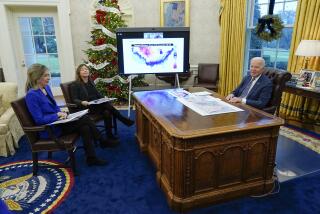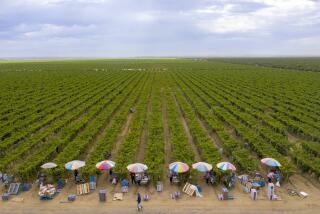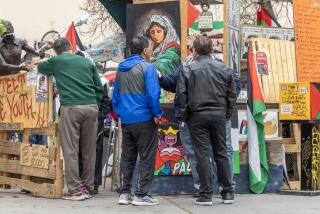UFW Pledges New Activism as March Ends : Labor: Cesar Chavezâs successor urges a return to grass-roots organizing during a âsummer of freedomâ to recoup the faltering farm unionâs successes.
SACRAMENTO â One year after the death of Cesar Chavez, thousands of United Farm Workers and their supporters gathered at the steps of the state Capitol on Sunday to hear Chavezâs son-in-law and successor, Arturo Rodriguez, outline a new beginning for the union hobbled by a decade of defeat.
In a speech that culminated a 24-day, 340-mile pilgrimage from Delano to Sacramento, Rodriguez urged the crowd of 11,000 to turn the energy and momentum of the long march into a âsummer of freedomâ for those who toil in the sun.
After a decade of relative quiet in the fields, he pledged, the UFW would once again confront growers and labor contractors with strikes and sit-ins and union elections.
âIf you are a farm worker, help us organize workers at your ranch and pressure the grower to sign a union contract,â Rodriguez said. âIf youâre from an urban community, come join and help us sign up farm workers. . . . Let the fields be alive with hope and activism as farm workers take direct action in ever-increasing numbers.â
Under a sky that threatened rain, marchers from as far away as Texas joined the pilgrimage, or peregrinacion, for its final leg through downtown Sacramento. Over the past month, thousands of others had briefly joined the march as it snaked its way through the vineyards and fruit orchards of the San Joaquin Valley.
Many said they had come to honor Chavez and retrace the steps the legendary leader had taken in the unionâs first trek to Sacramento 28 years ago. And they had come to announce to the world that nothing could kill the movement. Not Chavezâs death. Not the power of growers or the apathy of politicians. Not the lack of zeal by the Agricultural Labor Relations Board, the state agency that, they argue, no longer protects farm workers who join or want to join the union.
Jose Martinez, an 84-year-old retired farm worker who walked the entire route in 1966, this time had to be pushed in his wheelchair by his 50-year-old son, Tino. He resented any suggestion that the march was the last gasp of a dying union.
âTurn back around and take a look at the line behind you,â he said, gesturing to the throng of thousands marching across the drawbridge over the Sacramento River. âIs that a dead union?â
But the UFW has taken its lumps since the electric days of the 1970s and early â80s when nothing, it seemed, could stop it. That was a time when the union boasted 100,000 members and contracts with 80% of the San Joaquin Valley grape growers. Today, membership has dwindled to 15,000 and not a single contract with grape growers remains.
Rodriguez, the 44-year-old son of a retired sheet metal worker and high school teacher in San Antonio, on Sunday blamed governors Deukmejian and Wilson for gutting the Agricultural Labor Relations Act, the 1975 state law that gave farm workers the right to bargain collectively and to seek redress for unfair practices. The law is no longer vigorously enforced, he said, and growers simply fire workers who favor the union.
Labor experts agree that successive Republican administrations have sapped the unionâs strength in the fields, but some also blame the UFW for abandoning the blood-and-guts work of organizing in favor of a slick media campaign to promote its grape boycott.
On the eve of the march last month, Rodriguez acknowledged that the latest boycott, begun in 1984, had not translated into union contracts and higher wages and health benefits for farm workers. While the boycott will always remain a tool to âengage the consumer in the struggle,â he said, the focus of the unionâs efforts would now be on enlisting new members and pushing for new contracts.
âIn the past, 60 to 70% of our resources were used on the boycott,â he said in an interview. âNow, we will turn that around and 60 to 70% will be used to bring contracts to the field.â
Several of the 80 or so peregrinos who marched the entire 340 miles said the shift in union strategy was begun by Chavez himself. In the summer of 1992, he had sent Rodriguez to the Coachella Valley to instigate a series of walkouts that raised wages 25 to 50 cents an hour.
âCesar sensed that the farm workers were ready to take action again, and everything Iâve seen on this march makes me believe that is true,â said Lydia Moran, 55, a former farm worker who now works for Tulare County.
Moran held hands with Josefina Flores, 64, another marcher who had gone the whole way. Flores said she had been shot seven times by a ranch hand in Arvin during a 1968 union strike and was lucky to be alive.
âThe doctors told me I would never walk again. So the blisters and swollen ankles I got on this march were nothing. I would turn around and do it all over again for Cesar and the campesinos. â
When the pilgrimage began last month in the dusty fields outside Delano on the 67th anniversary of Chavezâs birth, Amelia Cadena carried a 12-foot, 30-pound wooden cross on her shoulders. The 68-year-old woman said she will never forget the smiles of the police officers she encountered along the way.
âTwenty-eight years ago, those same uniforms arrested me and locked me in jail in Bakersfield for three days,â she said. âWe have come a long way.â
She wore a yellow bandanna and straw sombrero over her weathered face and waved the same union flag--a black Aztec eagle on a red background--that she has carried for 30 years. Itâs the same flag that Chavez and Robert F. Kennedy signed so long ago, signatures wiped clean by the rain of this and past marches.
The wooden cross she bore was now being carried by 27-year-old Sergio Guzman, a mushroom worker under UFW contract who bade goodby to his 2-week-old son and $1,600 in wages to join the pilgrimage.
âI make $8.27 an hour, and others just like me make minimum wage,â he said. âThatâs the difference between being under union contract and not. Thatâs why I am marching.â
A number of politicians, including former Gov. Edmund G. (Jerry) Brown, joined the marchers on the last leg. It was Brown who pressed for and signed the 1975 state labor law. At the time, he recalled, Chavez predicted that new administrations would undermine the law. Brown said the union could no longer count on politicians or bureaucrats to pave the way.
âThey have to return to the fields and win the hearts and minds of the workers, the communities, the churches,â he said. âThey have to reinvigorate the movement from below. Forget the politicians and forget the bureaucrats. . . . They will cave in if the union demonstrates itâs got muscle again.â
More to Read
Get the L.A. Times Politics newsletter
Deeply reported insights into legislation, politics and policy from Sacramento, Washington and beyond. In your inbox three times per week.
You may occasionally receive promotional content from the Los Angeles Times.










